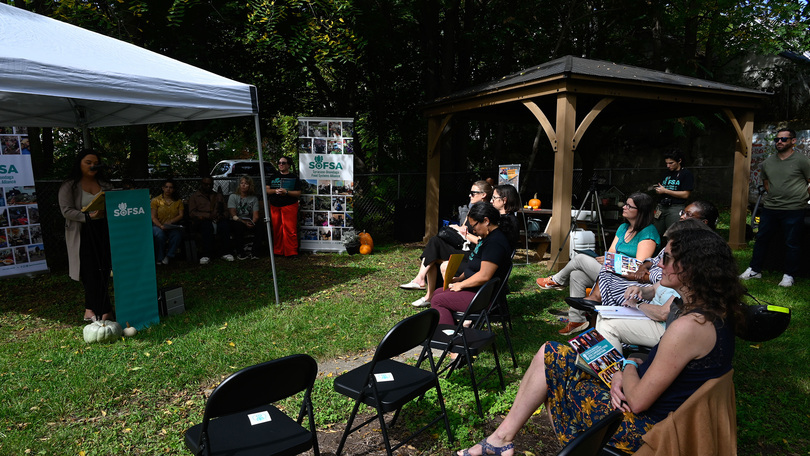Forum prompts Common Council, mayoral candidates on federally threatened food programs

The Syracuse-Onondaga Food Systems Alliance hosted a press conference to discuss government food programs amid federal cuts. District legislatures, mayoral and common council candidates were invited to address these issues and speak to voters. Christian Calabrese | Asst. Photo Editor
Get the latest Syracuse news delivered right to your inbox.
Subscribe to our newsletter here.
District legislatures, mayoral and common council candidates came together Monday afternoon to discuss the future of government food programs amid cuts at the federal level. With the Nov. 4 election quickly approaching, the press conference gave local leaders a forum to speak with voters about key food issues.
The Syracuse-Onondaga Food Systems Alliance — which hosted the event — sent candidates a questionnaire with specific questions about food policies before Monday’s event. Eighteen candidates responded, indicating whether they considered each policy a key priority and whether they supported or opposed it.
Representatives from SOFSA, an independent council that aims to reshape Syracuse’s food system, spoke on the importance of food issues, calling them “powerful.” It released its annual voters’ guide Monday, made to hold representatives accountable and help create a more “just and sustainable” food future in the city.
“Decisions made at every level of government shape what families can afford, what farmers can grow and so much more,” Maura Ackerman, SOFSA executive director, said.
Syracuse mayoral candidates Tom Babilon, the Republican candidate, and Alfonso Davis, an Independent, did not respond to the questionnaire and were not present at the event, according to the voter guide.
Independent mayoral candidate Tim Rudd spoke about his experience as a gardener and applauded the work put into the Haven Community Garden, where the event was located. He called the nonprofit space valuable for community engagement and collaboration.
The Haven garden is one of 25 community gardens focused on engaging the community and combating food insecurity in Syracuse. Co-founder Amy Tao Woodley said it was born out of the idea that everyone deserves access to fresh, healthy food and green spaces.
“It’s best when you have access to governments that will help you support your vision,” Rudd said.
Democratic mayoral candidate Sharon Owens was not present at the event, but responded to the questionnaire, listing some of her priorities on the voter guide. Owens outlined her plan to provide neighborhoods with access to fresh foods, increase urban farming opportunities and prioritize small, locally owned businesses.
“As Mayor, I will work to develop a comprehensive strategy that gets better use out of our vacant and underutilized land,” Owens wrote.
President Donald Trump’s administration passed the “One Big Beautiful Bill” in July, which includes a 15% cut to the Supplemental Nutrition Assistance Program funding for New York state. The program provides food benefits to low-income households and helps them afford more food options.
These cuts are expected to affect more than 300,000 households across New York state, including many children and seniors, CNY Central reported.
The questionnaire results showed that Owens and Rudd marked efforts, including “Reinvest in CNY Regional Market” and “Eliminating lead in soil and water,” as either key priorities or policies they support.
In 2023, Syracuse had the nation’s worst child poverty rate among larger national cities, a figure that fell by more than 7 percentage points in 2024, syracuse.com reported.
Rudd and Owens agreed that promoting grocery stores in low-access areas and creating anti-poverty solutions are key priorities.
All candidates who responded to the questionnaire agreed on protecting and expanding SNAP and the Special Supplemental Nutrition Program for Women, Infants, and Children, along with ensuring that New York-grown food is offered in all schools and institutions.
Executive Director of the Interfaith Community Collective, Galyn Murphy-Stanley, spoke about expected cuts to SNAP and Medicaid, urging attendees to consider the impact these cuts could have.
She explained that ICC finances their program with grants, donations and fundraisers, saying they often work with “struggling infrastructure” and a completely volunteer workforce.
“Our work is extremely difficult,” Murphy-Stanley said. “Maintenance or even an increase in Medicaid and SNAP benefits need to be at the front of mind as you move forward in your work for the people and to assist all of us working in the food system in Syracuse.”
Several other speakers, including Kenyata Calloway, candidate for Onondaga County Legislature 9th District, spoke about the impact of cutting SNAP benefits. Calloway said food security is a big issue for her as a young person who grew up receiving SNAP benefits.
Elaine Denton, running for Onondaga County Legislature in the 10th District, said rising costs of housing, food and utilities, combined with reduced SNAP benefits, are leaving families across Onondaga County without enough food.
“It’s time to get creative and find some new solutions, but first, we need to change our county’s current priorities from funding aquariums and corporations to ending hunger in our community,” Denton said.
Syracuse School District leaders have previously expressed concerns over the impact on free breakfast and lunch programs if federal grants are cut. A possible prolonged government shutdown on Wednesday has raised the possibility of disruptions to federal programs.
SOFSA Community Connector Tim Bryant said there was already uncertainty about who would receive SNAP benefits, prior to the shutdown. As a SNAP participant himself, he said many residents are concerned about the shutdown’s impact.
“It’s a scary time,” Bryant said. “How do you provide meals for your family?”
Ackerman said many food-focused organizations, like food pantries and food banks, are concerned about the downstream impacts of a federal government shutdown as they rely on federal funds.
“It’s like one of those times that we realize how much government actually infiltrates our lives, and how important it is,” Ackerman said. “Those public goods that we rely upon and that when they’re working, we don’t even think about them.”
Nodesia Hernandez, 17th District candidate, said a policy that increases the SNAP minimum to $100 is necessary because community members are discouraged from applying when the benefit is only $25.
She added that her caucus has yet to meet about the possible impacts of a government shutdown, but expects Republican and Democratic legislative leaders won’t agree on the issue of federally funded food assistance programs.
SOFSA organizers said their goal is to promote civic engagement and policy development to address food insecurity issues. In preparation for the event, the organization held community listening sessions and other processes to identify priorities, Ackerman said.
“Food is community to so many of us and … the integration of our personal narratives with our political beliefs, and how we see that through in reality, is really what we saw today from all the candidates and from the community,” Ackerman said.





